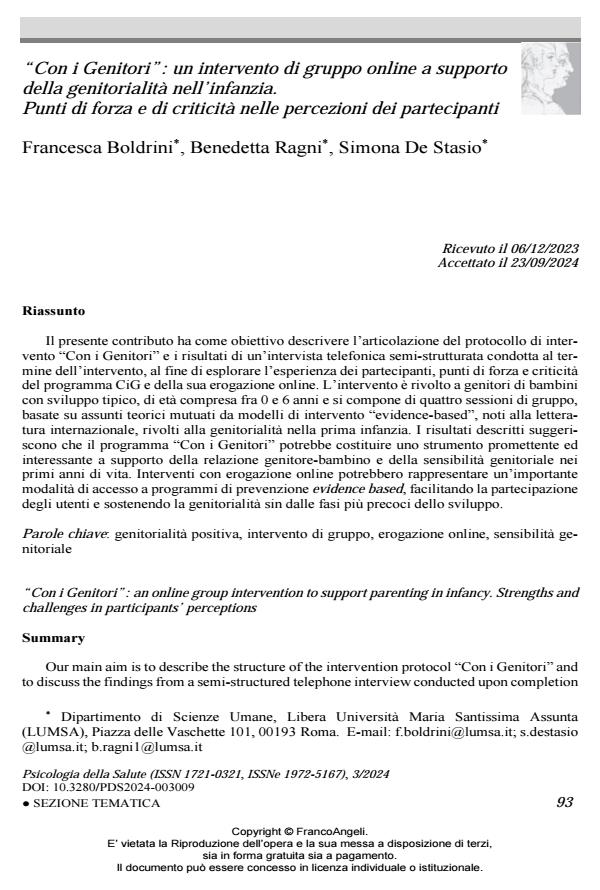“Con i Genitori”: un intervento di gruppo online a supporto della genitorialità nell’infanzia. Punti di forza e di criticità nelle percezioni dei partecipanti
Titolo Rivista PSICOLOGIA DELLA SALUTE
Autori/Curatori Francesca Boldrini, Benedetta Ragni, Simona De Stasio
Anno di pubblicazione 2024 Fascicolo 2024/3
Lingua Italiano Numero pagine 20 P. 93-112 Dimensione file 294 KB
DOI 10.3280/PDS2024-003009
Il DOI è il codice a barre della proprietà intellettuale: per saperne di più
clicca qui
Qui sotto puoi vedere in anteprima la prima pagina di questo articolo.
Se questo articolo ti interessa, lo puoi acquistare (e scaricare in formato pdf) seguendo le facili indicazioni per acquistare il download credit. Acquista Download Credits per scaricare questo Articolo in formato PDF

FrancoAngeli è membro della Publishers International Linking Association, Inc (PILA), associazione indipendente e non profit per facilitare (attraverso i servizi tecnologici implementati da CrossRef.org) l’accesso degli studiosi ai contenuti digitali nelle pubblicazioni professionali e scientifiche.
Il presente contributo ha come obiettivo descrivere l’articolazione del protocollo di intervento “Con i Genitori” e i risultati di un’intervista telefonica semi-strutturata condotta al termi-ne dell’intervento, al fine di esplorare l’esperienza dei partecipanti, punti di forza e criticità del programma CiG e della sua erogazione online. L’intervento è rivolto a genitori di bambini con sviluppo tipico, di età compresa fra 0 e 6 anni e si compone di quattro sessioni di gruppo, basate su assunti teorici mutuati da modelli di intervento “evidence-based”, noti alla letteratura internazionale, rivolti alla genitorialità nella prima infanzia. I risultati descritti suggeriscono che il programma “Con i Genitori” potrebbe costituire uno strumento promettente ed interessante a supporto della relazione genitore-bambino e della sensibilità genitoriale nei primi anni di vita. Interventi con erogazione online potrebbero rappresentare un’importante modalità di accesso a programmi di prevenzione evidence based, facilitando la partecipazione degli utenti e soste-nendo la genitorialità sin dalle fasi più precoci dello sviluppo.
Parole chiave:genitorialità positiva, intervento di gruppo, erogazione online, sensibilità genitoriale
Francesca Boldrini, Benedetta Ragni, Simona De Stasio, “Con i Genitori”: un intervento di gruppo online a supporto della genitorialità nell’infanzia. Punti di forza e di criticità nelle percezioni dei partecipanti in "PSICOLOGIA DELLA SALUTE" 3/2024, pp 93-112, DOI: 10.3280/PDS2024-003009